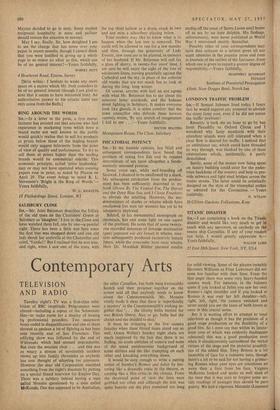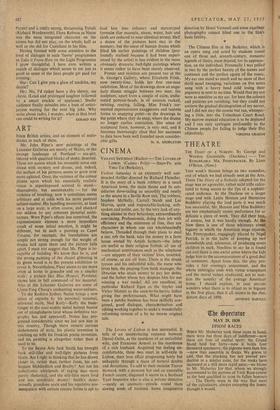the other Canadian, but both were irrevocably Scotch and their
presence together on the screen said all that anybody needs to know about the Commonwealth. Mr. Menzies wisely made it clear that there is 'superficially a mystery' in the Commonwealth's sticking to- gether that . . the liberty India battled for was British liberty. Stay or go, India had the choice and she decided to stay.' for solid viewing. Some of the players (notably Harcourt Williams as Friar Lawrence) did not seem too familiar with their lines. From the film angle there was some very heavy-handed camera work. For instance, in the balcony scene if you looked at Juliet you saw her over Romeo's right shoulder and if you looked at Romeo it was over her left shoulder—left. right, left. right, the camera switched and never could you see the faces of both lovers at once in this crucial scene.
But it is wasting effort to attempt to treat television as though it has the precision of a good stage production or the flexibility of a good film. So I must say that within its limita- tions (one of which was evidently inadequate rehearsal) this was a good production even when it simultaneously surrendered the verbal virtues of the stage and the pictorial possibili- ties of the edited film. Tony Britton is a bit immobile of face for a romantic hero, though there's a lot to be said for not having a grimac- ing Romeo when your eyes are sometimes no more than a foot from his face.• Virginia McKcnna looked and spoke so well most of the time that it was easy to forgive sonic un- tidy readings of passages that should be pure poetry. We had a vigorous Mereutio (Laurence Payne) and a really strong, threatening Tybalt (Richard Wordsworth). Flora Robson as Nurse was the most integrated character on the screen but did not play, on the whole, half as well as she did for Castellani in his film.
Having listened with some attention to the level of dialogue in such 'funny' programmes as Take it From Here on the Light Programme 1 grow thoughtful. I have even written a snatch of dialogue which seems to me just as good as some of the lines people get paid for creating:
She Can I give you a glass of madcira, my &ado?
He: No, I'd rather have a dry sherry, ma cherie. (Loud and prolonged laughter followed by a smart crackle of applause.) Studio audience finally subsides into a hum of antici- pation waiting for the next big joke. Why write about radio, I wonder, when at that level one could be writing for it? GERARD FAY



































 Previous page
Previous page